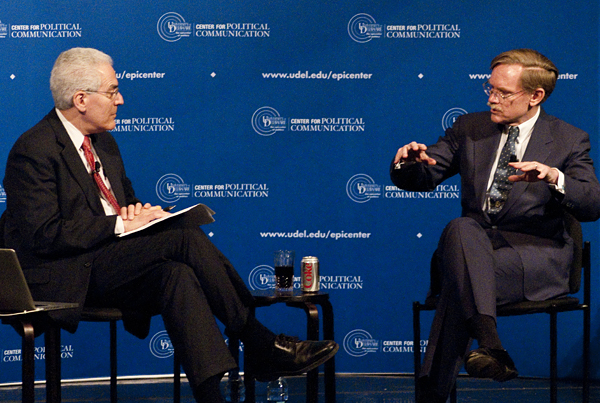
World Bank president urges global connections
Robert B. Zoellick speaks in Global Agenda series
4:13 p.m., March 10, 2011----The World Bank, which loans money and assists development in the poorest nations, works with those countries and their citizens as partners in a variety of projects to improve their lives, the bank's president said Wednesday at the University of Delaware.
While the bank may once have been viewed as imposing the will of the United States and other wealthier nations on their poorer counterparts, that is no longer the case, Robert B. Zoellick told a packed auditorium in Mitchell Hall. Zoellick, the 11th president of the World Bank, spoke and answered questions as part of UD's 2011 Global Agenda series, which focuses on the theme, “Mirror, Mirror: Perceptions of America Abroad.”
Global Stories
Fulbright awards
Peace Corps plans
In the past decade, he said, the World Bank, which has 187 member countries, has increasingly worked in partnership with other nations and with international organizations such as United Nations agencies and nonprofits like the Bill and Melinda Gates Foundation. Before the bank funds a development project, it works with the local government and grassroots groups to ensure that the project will meet the needs and priorities the residents have identified, he said.
“One thing we've learned the hard way over 50 years -- outsiders can't do it for you,” Zoellick said, emphasizing the importance of local participation. “No individual or country likes to feel dependent.”
The World Bank is involved in a wide range of projects, particularly through its International Development Association fund for the 79 poorest nations. Its activities have included supplying mosquito nets in Zambia to prevent malaria; cleaning waterways in Haiti to control the spread of cholera; financing the construction of basic infrastructure, and the creation of jobs, in Yemen; and supporting projects in Bangladesh that provide such services as clean water while empowering communities and particularly women.
Much of the fund's work is centered on women, Zoellick said, because of the need to improve maternal and child health and to offer women such economic benefits as property rights and access to credit. The World Bank also works with projects that consider climate change and other environmental aspects.
“The work of the World Bank can't just be put in a neat little economic box,” Zoellick said, but is aimed at supporting economic growth that is “inclusive and sustainable.”
In answer to a question about why all the bank's presidents have been American, he said part of the explanation is that when the World Bank and the International Monetary Fund (IMF) were set up at the end of World War II, there was an informal agreement that the bank would be led by an American and the IMF by a European. That could change when the World Bank's board of governors chooses future presidents, he said.
However, he cautioned those who want a non-American to lead the bank: “Be careful what you ask for.” In the current U.S. budget-cutting climate, he said, having America fully involved in the World Bank is a benefit for its continuing support.
Zoellick also praised the Global Agenda Series for bringing international issues and perspectives to the UD community. “It's absolutely critical that the United States stay engaged” with the rest of the world, he said.
Before joining the bank, Zoellick was international vice chairman of the Goldman Sachs Group and, from 2005-06, served as the deputy secretary of the U.S. State Department. From 2001-05, he was the U.S. trade representative, and he previously was a top State Department office under Secretary James A. Baker, when, among other accomplishments, he was the lead U.S. official in the post-Cold War process of German reunification.
The University's 10-year-old Global Agenda series, which is free and open to the public, takes place in Mitchell Hall on Wednesdays. A complete schedule is available at its website. The series is presented by the Center for Political Communication, with support from the Institute for Global Studies, the departments of Communication and of Political Science and International Relations and the Muslim Students' Association.
The talks, which include substantial question-and-answer sessions, are moderated by Ralph J. Begleiter, director of the Center for Political Communication, who also is UD Distinguished Journalist in Residence and Rosenberg Professor of Communication.
Article by Ann Manser
Photo by Duane Perry









